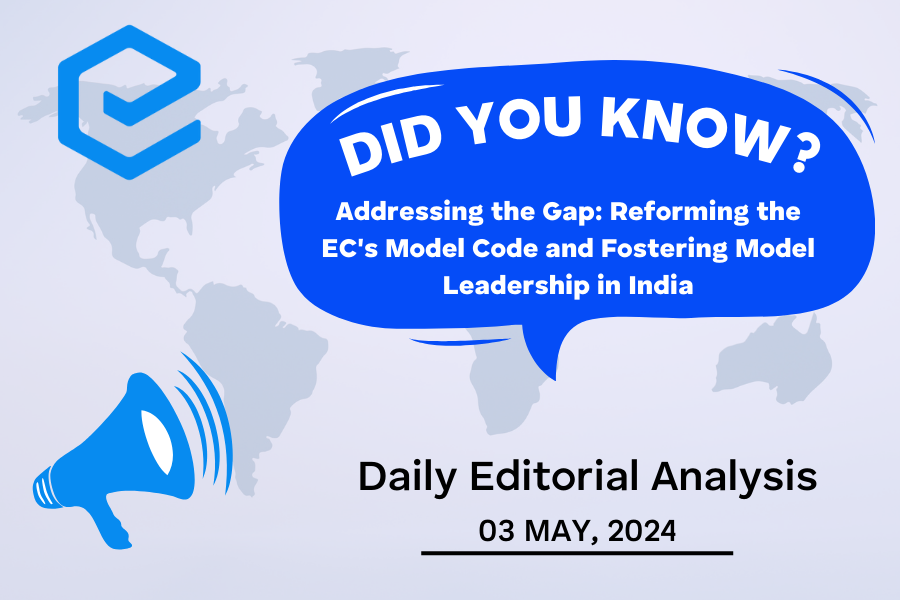
Addressing the gap between theory and practice in governance, reforming the Election Commission of India’s (EC) Model Code is imperative for fostering model leadership in India. The EC’s Model Code serves as a guiding framework during elections, aiming to ensure fair play and ethical conduct among political parties. However, its effectiveness has been questioned due to instances of non-compliance and loopholes exploited by politicians. To bridge this divide, reforms must focus on enhancing accountability mechanisms, streamlining enforcement procedures, and introducing stringent penalties for violations. Moreover, cultivating a culture of model leadership necessitates proactive engagement from political stakeholders, civil society, and the media to uphold democratic principles and elevate electoral integrity. By fortifying the EC’s Model Code, India can reinforce its commitment to democratic ideals and pave the way for exemplary governance practices.
Tag: GS-2 Polity
In News: The Model Code of Conduct (MCC), vital for fair elections in India, has evolved over time but faces challenges today. Analysing its history, identifying current issues, and proposing enforcement measures are crucial.
Contents
- 0.1 Origins and Expansion Of MCC
- 0.2 Challenges and the Need for Strengthening Enforcement
- 0.3 Proposed Reforms to Strengthen Enforcement
- 0.4 The Role of Political Parties and Election Commission
- 0.5 Conclusion
- 1 Frequently Asked Questions (FAQs)
- 1.1 1. FAQ: Why is there a need to reform the Election Commission of India’s (EC) Model Code?
- 1.2 2. FAQ: How can reforms in the EC’s Model Code foster model leadership in India?
- 1.3 3. FAQ: What challenges are faced in implementing reforms to the EC’s Model Code?
- 1.4 4. FAQ: How can civil society contribute to the reform process of the EC’s Model Code?
- 1.5 5. FAQ: What benefits will India reap from strengthening the EC’s Model Code?
- 2 In case you still have your doubts, contact us on 9811333901.
Origins and Expansion Of MCC
- The MCC emerged in the 1960s as basic guidelines for election conduct, initially applied in Kerala’s Assembly elections.
- Over time, it grew in scope and importance under various Chief Election Commissioners (CECs).
Challenges and the Need for Strengthening Enforcement
- Escalating Violations
- Political parties and candidates frequently disregard the MCC’s provisions, engaging in activities like hate speech and misinformation campaigns.
- Exploitation of Loopholes
- Modern political actors exploit MCC loopholes, especially with the advent of technology and social media.
- Inadequate Deterrents
- The MCC lacks meaningful consequences for violations, leading to a perception of impunity among politicians.
- Complexity of Enforcement
- India’s diverse electoral landscape strains the Election Commission’s (EC) enforcement capabilities, with lengthy adjudication processes.
- Erosion of Public Trust
- Widespread disregard for the MCC erodes public confidence in the electoral process, fostering voter apathy.
Proposed Reforms to Strengthen Enforcement
- Clear and Comprehensive Guidelines
- Establishing clear and updated guidelines on permissible conduct during electoral campaigns.
- Strict Enforcement Mechanisms
- Imposing proportional penalties for violations and streamlining enforcement procedures for swift adjudication.
- Indirect Liability for Political Parties
- Holding parties accountable for MCC violations regardless of individual culpability.
- Transparency and Public Accountability
- Maintaining a publicly accessible database of MCC violations to bolster transparency.
- Timely and Credible Adjudication
- Prioritizing prompt resolution of cases to maintain the MCC’s deterrent effect.
- Continuous Evaluation and Revision
- Continuously updating the MCC to address emerging challenges and changing electoral dynamics.
The Role of Political Parties and Election Commission
- The Role of Political Leadership
- Promoting ethical standards and responsible conduct within parties to inspire confidence in the electoral process.
- The Role of Election Commission
- Impartially adjudicating MCC violations and enforcing regulations to uphold electoral integrity.
- Enhancing the EC’s Capacity
- Investing in training, technological infrastructure, and human resources to adapt to evolving challenges.
Conclusion
Strengthening the MCC through reforms and fostering ethical leadership can reinforce India’s democratic processes and ensure free and fair elections for all citizens.
Source: IE
Frequently Asked Questions (FAQs)
1. FAQ: Why is there a need to reform the Election Commission of India’s (EC) Model Code?
- Answer: The EC’s Model Code is essential for maintaining fair elections, but its effectiveness has been hindered by loopholes and non-compliance. Reform is necessary to strengthen accountability and uphold democratic principles.
2. FAQ: How can reforms in the EC’s Model Code foster model leadership in India?
- Answer: Reforms aim to enhance accountability mechanisms, streamline enforcement procedures, and introduce stringent penalties for violations. This fosters a culture of ethical conduct among political leaders, promoting model leadership in governance.
3. FAQ: What challenges are faced in implementing reforms to the EC’s Model Code?
- Answer: Challenges include resistance from political parties, complexities in enforcement, and ensuring uniform compliance across diverse regions. Overcoming these hurdles requires collaborative efforts from stakeholders and robust enforcement mechanisms.
4. FAQ: How can civil society contribute to the reform process of the EC’s Model Code?
- Answer: Civil society plays a crucial role in advocating for transparency, accountability, and electoral integrity. By raising awareness, monitoring elections, and engaging with policymakers, civil society can exert pressure for meaningful reforms.
5. FAQ: What benefits will India reap from strengthening the EC’s Model Code?
- Answer: Strengthening the EC’s Model Code will enhance public trust in the electoral process, ensure a level playing field for all political parties, and bolster India’s reputation as a beacon of democracy. Additionally, it will pave the way for exemplary governance practices and foster model leadership in the country.
In case you still have your doubts, contact us on 9811333901.
For UPSC Prelims Resources, Click here
For Daily Updates and Study Material:
Join our Telegram Channel – Edukemy for IAS
- 1. Learn through Videos – here
- 2. Be Exam Ready by Practicing Daily MCQs – here
- 3. Daily Newsletter – Get all your Current Affairs Covered – here
- 4. Mains Answer Writing Practice – here

